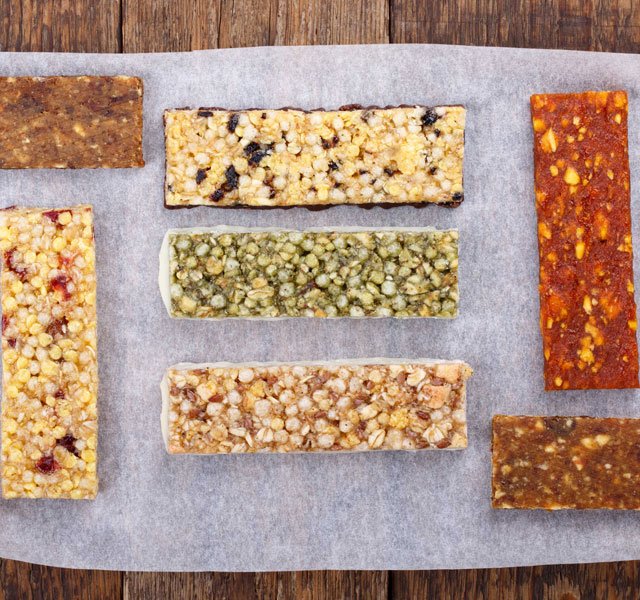Walk down any grocery store aisle, and you’re bound to find a product that looks much healthier than it is in reality. Example: protein bars. Despite the marketing lingo touting their nutritional value (Organic! All natural! Packed with protein!), some varieties can contain more sugar than a candy bar.
Still, though, that doesn’t mean all protein bars have to stay out of your pantry. Some can be great sources of protein or calories when you’re on the go.
To help you determine which bars are right for you, we asked Halle Saperstein, registered dietitian with Henry Ford Health, about protein basics and what to look for in a balanced bar.
Q: In general, what is the role of protein in your diet?
Protein does a lot. It plays a critical role in the structure, function and regulation of your body’s tissues and organs. It helps with nutrient transport. It carries your electrolytes—your sodium and potassium—into and out of your cells. Without adequate protein, our cells and tissues really can’t function. It helps to carry vitamins to cells from your organs. It’s also a building block for your muscles, skin, bones, blood and cartilage.
Q: How does protein affect your muscles?
Protein helps you enhance muscle repair and growth. There are a couple different recommendations regarding when you should consume protein after a workout. It’s best within two hours after exercise if you’re going to have a protein source and you’re trying to enhance your muscle repair and growth. Sometimes, though, you need a little bit of protein before exercise. If you’re just waking up and you haven’t eaten in five or six hours, you may want some kind of protein and carbohydrate source prior to working out just to make it a more efficient workout.
Q: As a registered dietitian, where do you stand on protein bars?
I’m not a huge advocate of protein bars, but that doesn’t mean I don’t keep lower sugar varieties in my own cabinet at home. At times, we all need a quick snack option. The thing to remember is: Most protein bars—not all—have a lot of fillers in them. They’re more processed than whole foods, and they often contain whey and soy concentrates. Those ingredients won’t be readily utilized as well as a complete protein source would be. So if you’re going to eat something before or after a workout, I would suggest a whole food source of protein like a banana and peanut butter or some milk or a yogurt.
Q: If you are snacking on a protein bar, what ingredients should you look for?
Here are a few things to keep in mind:
- Carbohydrates. A low carb bar should be less than 20 grams per bar.
- Protein. Look for ingredients like whey and pea proteins.
- Fiber. Look for bars with three grams or more per serving. You’ll feel more full and be more regular.
- Fats. A good bar shouldn’t have any trans fats and should be low in saturated fats (less than three grams per serving).
- Oils. Avoid any bars with palm oil or kernel oil (often included in bars coated with chocolate)
- Sugar. If sugar, sucrose or high fructose corn syrup is the main ingredient, don’t buy it. Also avoid sugar alcohols like xylitol, sorbitol and maltitol—they cause bloating and gas and have a laxative effect.
Q: Are there any specific bars or brands that you recommend?
Here are three I recommend:
- The Strong and Kind bars by KIND. They have 230 calories and 10 grams of protein.
- Lara Bars. Some have just three ingredients, five grams of protein and four grams of fiber.
- Rx Bars. They can be expensive, but they offer five grams of fiber and 12 grams of protein.
Q: How much protein do we need to consume every day?
It varies widely with your activity level. Most Americans need 0.8 grams per kilogram of their body weight. But if you’re an athlete who exercises vigorously every day for 60 minutes or so, then you need up to 1.2 grams of protein per kilogram of body weight, which equates to about 15 to 25 percent of your calorie needs. But everybody’s body size is different, so it varies greatly.
Q: Is there such a thing as too much protein?
Yes. Having too much protein beyond what you need can be really taxing on our bodies, especially the kidneys. If you eat more protein than what your body can use for muscle building or anything else, eventually any of that surplus can be stored as fat.
Q: Should you eat protein bars if you’re trying to lose weight?
I typically recommend protein bars as a small snack, not a meal replacement. If you eat a bar that is 200 calories versus a meal that is 800 calories, you’re probably going to lose weight, but you’re also probably not eating enough to meet your nutritional needs, especially if you’re exercising as well.
Regardless of why you’re reaching for a protein bar, Saperstein suggests that you always read the label carefully and educate yourself on nutritional information. “Companies can make the boxes look really good, and they can fool the consumer,” Saperstein says. “What you see isn’t always what you get.”
To make an appointment with a Henry Ford doctor or dietitian to discussion nutrition and your health, visit henryford.com or call 1-800-HENRYFORD (436-7936).
Halle Saperstein, RD, is a clinical dietitian at Henry Ford West Bloomfield Hospital and enjoys teaching the importance and benefits of a healthy diet.



